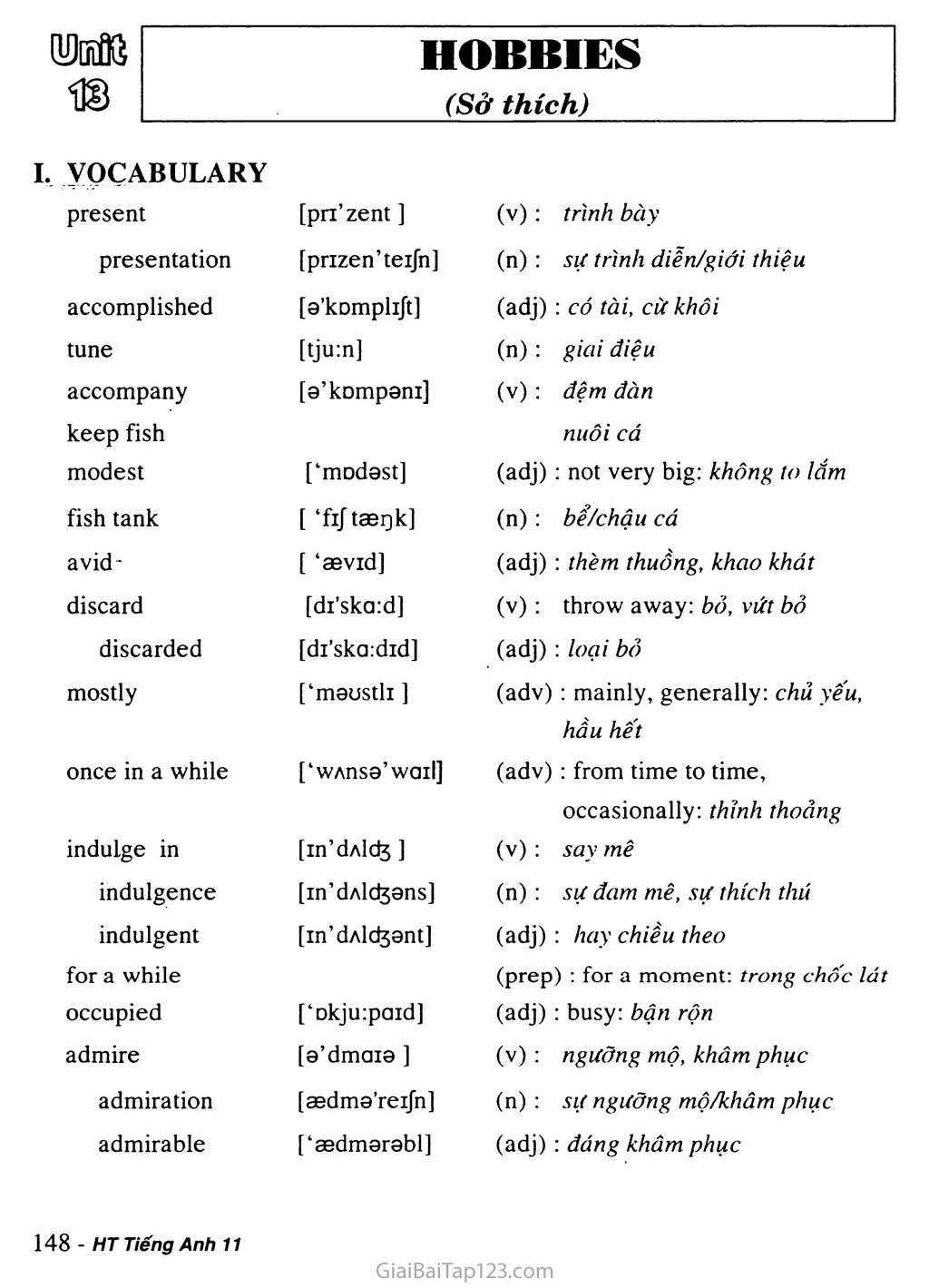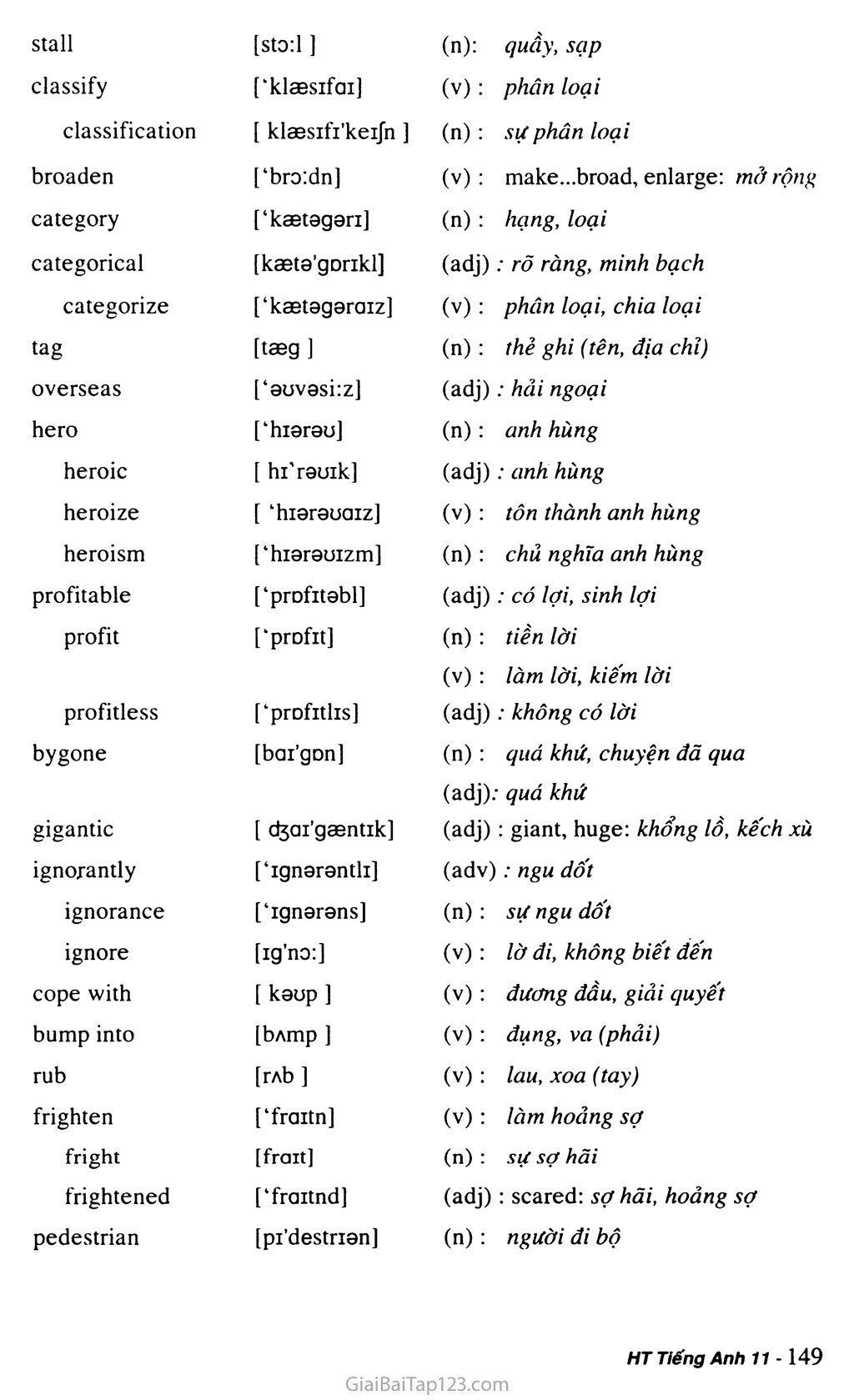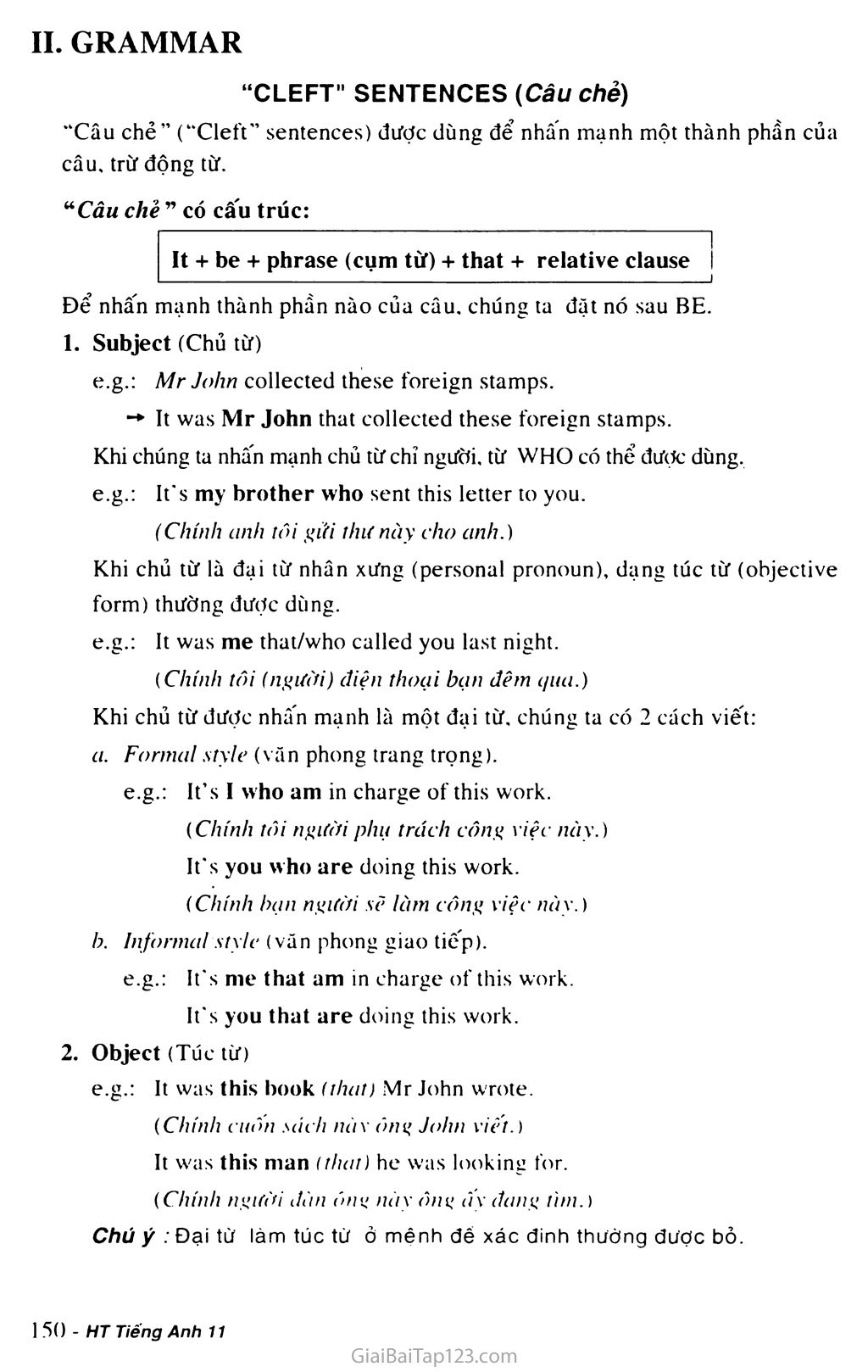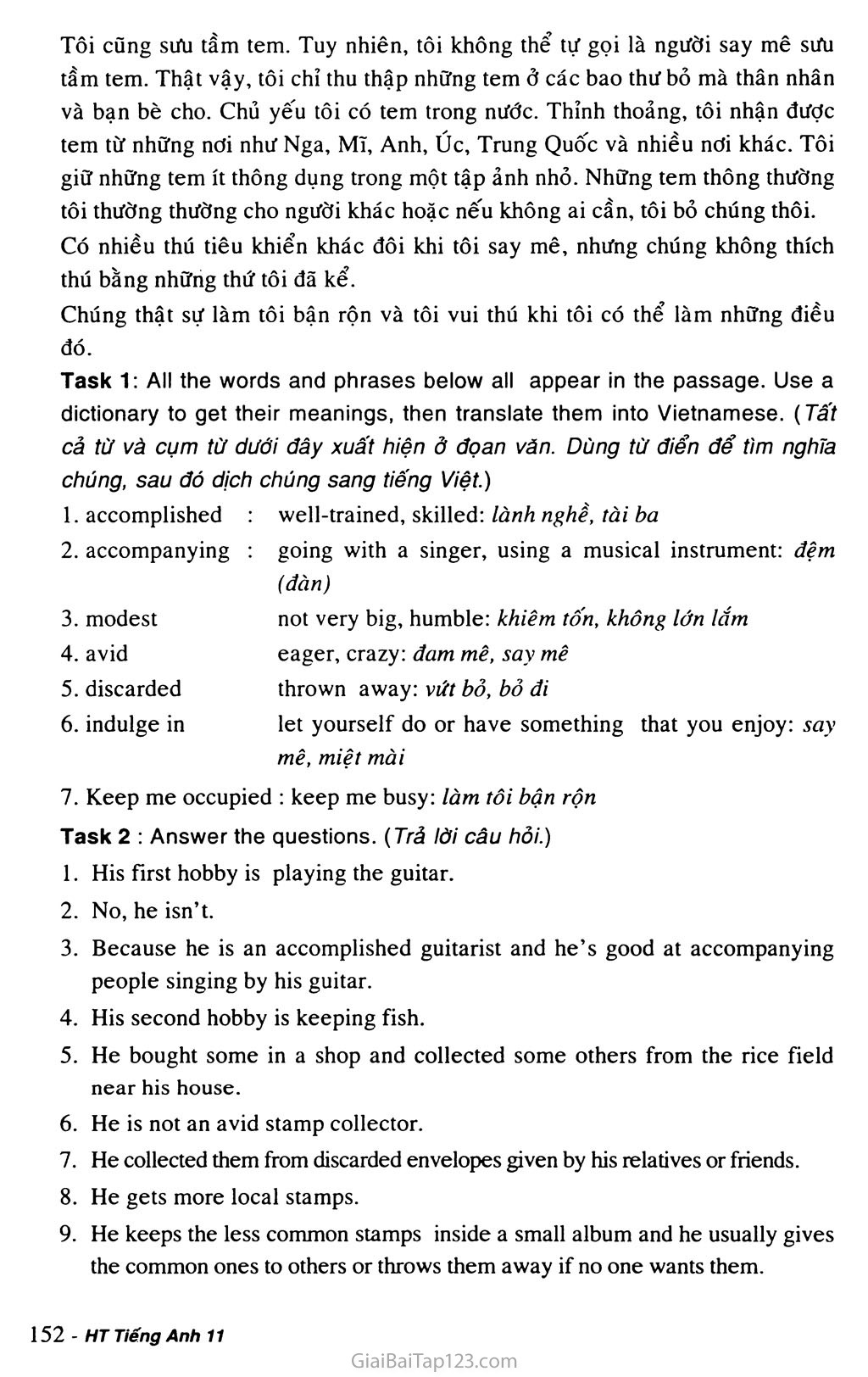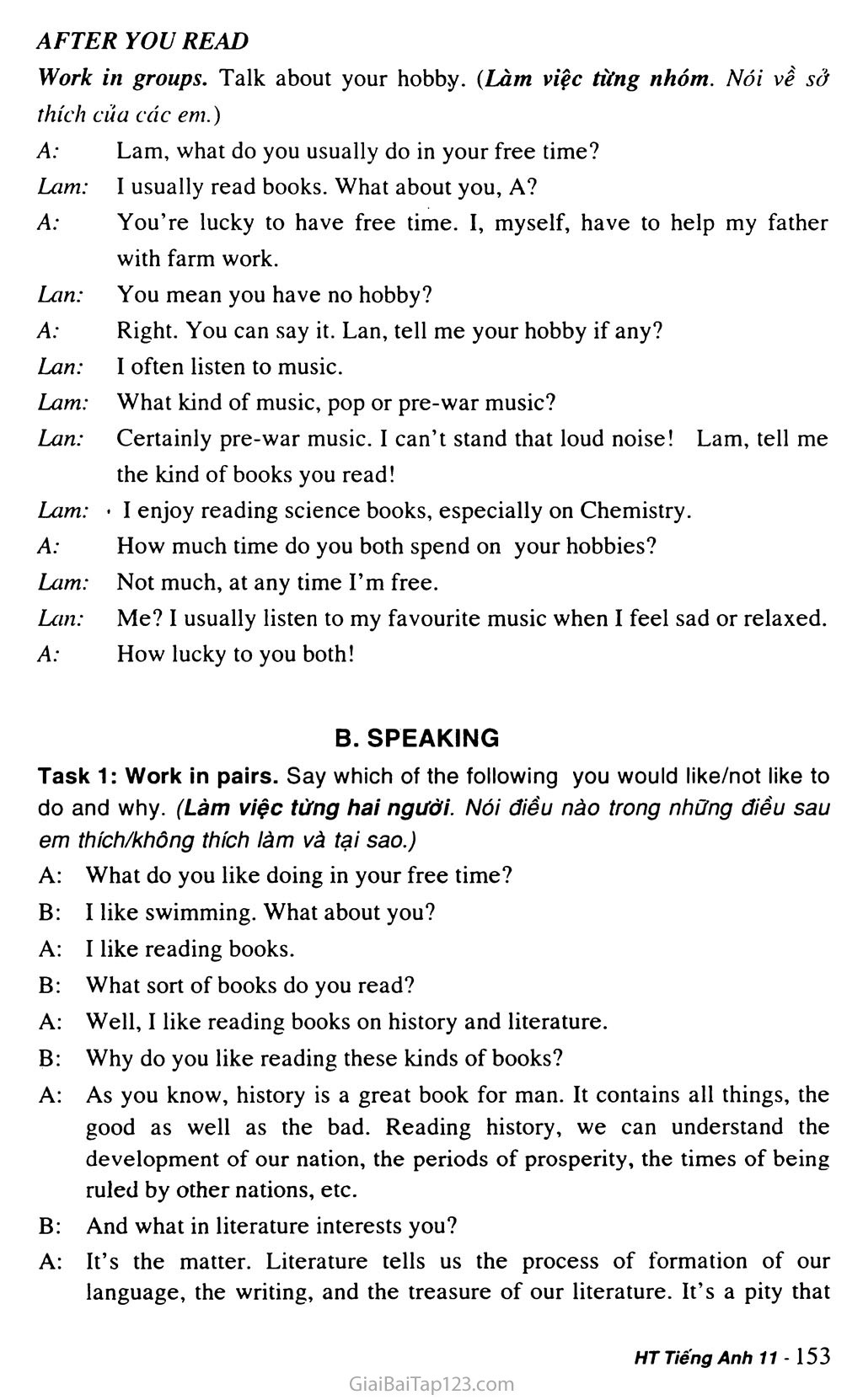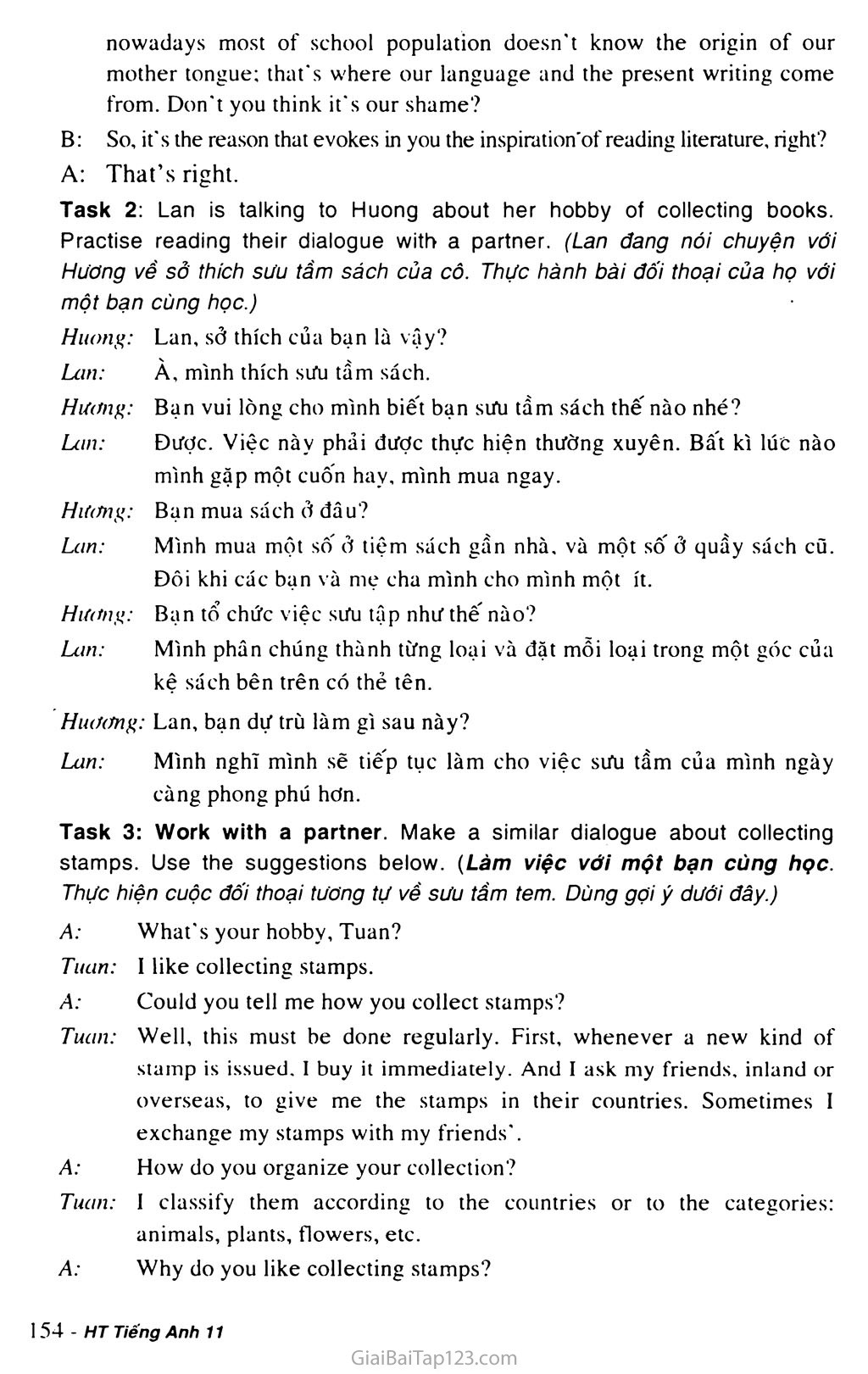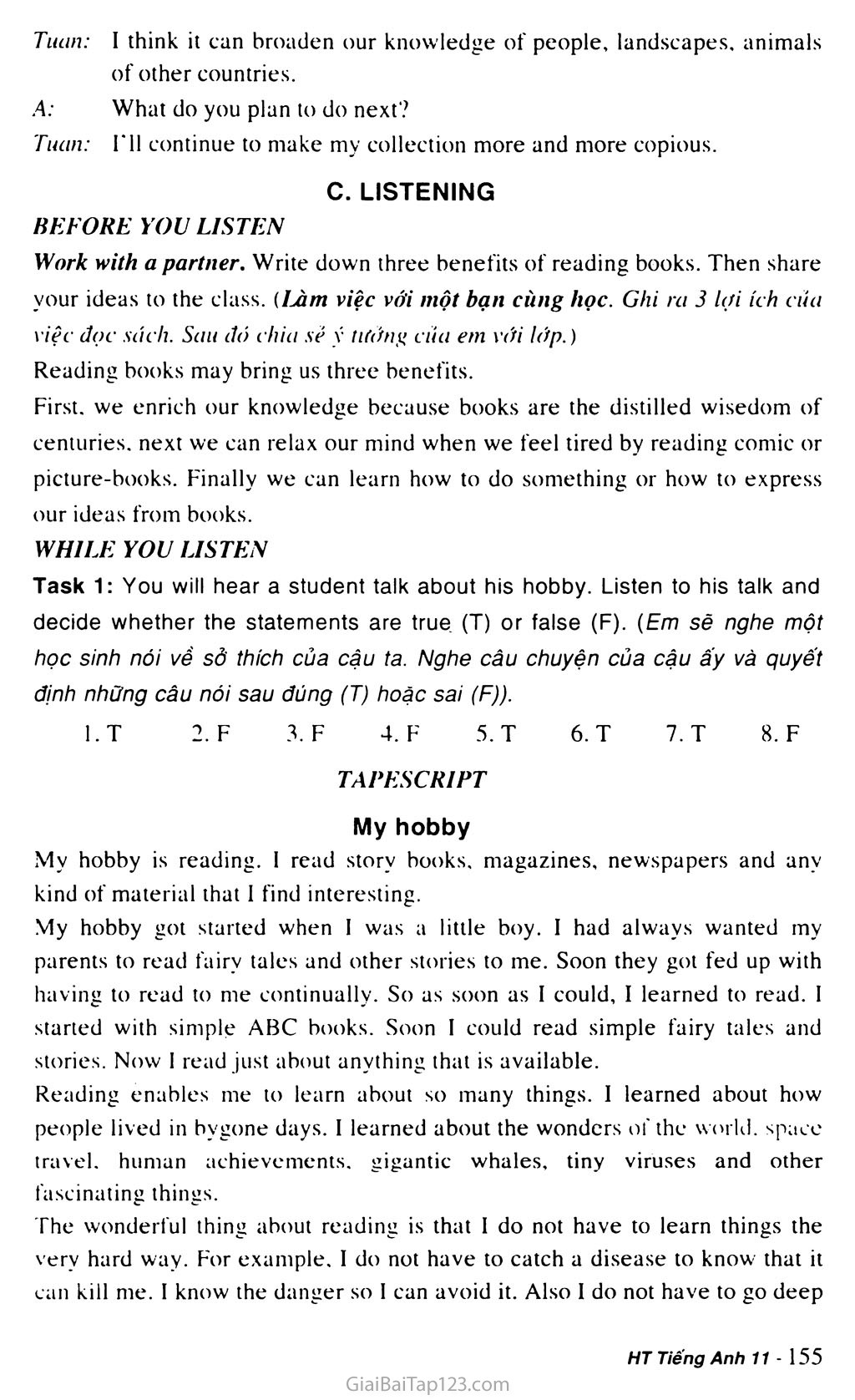Giải tiếng Anh lớp 11 Unit 13: HOBBIES
HOBBIES
(Sở thích)
VOCABULARY
present
[pri’zent ]
presentation
[prizen’teijn]
accomplished
[o’kDmpli/t]
tune
[tju:n]
accompany
[o’kDmpom]
keep fish
modest
[‘mDdsst]
fish tank
[ ‘fij tseqk]
avid
[ ‘aevid]
discard
[di’ska:d]
discarded
[di’ska.'did]
mostly
[‘moustli ]
once in a while
[*WAnso’wail]
indulge in
[in’dAlds ]
indulgence
[in’dAldjens]
indulgent
[in’dAlcfjont]
for a while
occupied
[*Dkju:paid]
admire
[e’dmais ]
admiration
[sedms’reijn]
admirable
["aedmorobl]
(v) : trình bày
(n) : sự trình diễn/giới thiệu (adj) : có tài, cừ khôi (n): giai điệu (v) : đệm đàn
nuôi cá
(adj) : not very big: không to lắm (n) : bể/chậu cá (adj) : thèm thuồng, khao khát (v) : throw away: bỏ, vứt bỏ (adj) : loại bỏ
(adv) : mainly, generally: chủ yếu, hầu hết
(adv) : from time to time,
occasionally: thỉnh thoảng
(v) : say mê
(n) : sự đam mê, sự thích thú
(adj) : hay chiều theo
(prep) : for a moment: trong chốc lát
(adj) : busy: bận rộn
(v) : ngưỡng mộ, khâm phục
(n) : sự ngưỡng mộ/khâm phục
(adj) : đáng khăm phục
Stall
[sto:l ]
(n): quấy, sạp
classify
[’kleesifdi]
(v) : phân loại
classification
[ klaesifl’keijn ]
(n) : sự phân loại
broaden
[*bro:dn]
(v) : make...broad, enlarge: mở rộng
category
[‘kaetagarx]
(n) : hạng, loại
categorical
[kaeta'gDrikl]
(adj): rõ ràng, minh bạch
categorize
[‘kaetagaraiz]
(v) : phân loại, chia loại
tag
[tseg ]
(n) : thẻ ghi (tên, địa chỉ)
overseas
[‘auvasi:z]
(adj) : hải ngoại
hero
[‘hiarau]
(n) : anh hùng
heroic
[ hi’rauik]
(adj); anh hùng
heroize
[ ‘hiarauaiz]
(v) : tôn thành anh hùng
heroism
[‘hiarauizm]
(n) : chủ nghĩa anh hùng
profitable
[‘prDfitabl]
(adj) : có lợi, sinh lợi
profit
[ ‘profit]
(n) : tiền lời
(v) : làm lời, kiếm lời
profitless
I'prDfitlis]
(adj) : không có lời
bygone
[bai'gDn]
(n) : quá khứ, chuyện đã qua
(adj); quá khứ
gigantic
[ d3ai'gcentik]
(adj) : giant, huge: khổng lồ, kếch xù
ignorantly
[‘ignarantli]
(adv) : ngu dốt
ignorance
[‘ignarans]
(n) : sự ngu dốt
ignore
[ig’no:]
(v) : lở đi, không biết đến
cope with
[ kaup ]
(v) : đương đầu, giải quyết
bump into
[bAmp ]
(v) : đụng, va (phải)
rub
[rAb ]
(v) : lau, xoa (tay)
frighten
[‘fraitn]
(v) : làm hoảng sợ
fright
[frait]
(n) : sự sợ hãi
frightened
[‘fraitnd]
(adj) : scared: sợ hãi, hoảng sợ
pedestrian
[pi'destrian]
(n) : người đi bộ
II. GRAMMAR
“CLEFT" SENTENCES (Câu chẻ)
“Câu chẻ” (“Cleft” sentences) dưực dùng để nhân mạnh một thành phần của câu, trừ động từ.
“CỔM chẻ ” có câu trúc:
— ? ’ ’ — ~ ~ :
It + be + phrase (cụm từ) + that + relative clause
z _____ I
Để nhân mạnh thành phần nào của câu. chúng ta đặt nó sau BE.
Subject (Chủ từ)
e.g.: Mr John collected these foreign stamps.
-* It was Mr John that collected these foreign stamps.
Khi chúng ta nhấn mạnh chủ từ chỉ người, từ WHO có thể được dùng, e.g.: It's my brother who sent this letter to you.
(Chính anh lôi iỊtỉi thư này cho anh.)
Khi chủ từ là đại từ nhân xưng (personal pronoun), dạng túc từ (objective
form) thường được dùng.
e.g.: It was me that/who called you last night.
(Chính tôi (nyưừi) điện thoại bạn đêm (/na.)
Khi chủ từdược nhân mạnh là một đại từ, chúng ta có 2 cách viết:
Formal style (văn phong trang trọng), e.g.: It’s I who am in charge of this work..
(Chính tôi nyười phụ trách côny việc này.)
It's you who are doing this work.
(Chính hạn nyưòi sẽ làm cony việc này.)
Informal style (văn phong giao tiếp).
e.g.: It's me that am in charge of this work.
It's you that are doing this work.
Object (Túc từ)
e.g.: It was this hook (that) Mr John wrote.
(Chính cuốn sách nàv ôny Joint viết.)
It was this man (that) he was looking for.
(Chính nyưòi (Ian óny này òny â V daily tìm.)
Chú ý : Đại từ làm túc tử ở mênh đê xác đinh thường được bỏ.
Adverbial phrase (cụm trạng từ).
e.g.: It’s in this village that Phan Thanh Gian was born.
(Chính (Elàng này Phan Thanh Giản được sinh ra.)
It was by working hard that he succeeded in the competition.
(Chínlì nhờ làm việc chăm chí anh ấy thành công trong cuộc thi.)
Chú ý : Khi nhấn mạnh cụm trạng từ không bỏ từ THAT.
Đôi khi chúng ta có thể nhân mạnh cả mệnh đề (a whole clause).
e.g.: It was after their parents died that they realized how important the parental love was!
(Clĩính khi cha mẹ họ mất, họ ý thức được tình thương của cha mẹ quan trọng dường nào!)
III. SOLUTIONS AND TRANSLATIONS (LỜI GIẢI VÀ BÀI DỊCH)
A. READING
BEFORE YOU READ
The pictures below present some hobbies. Work with a partner and say which you like to do in your free time. (Các hình dưới đây giúi thiệu một số thú tiêu khiển. Làm việc với một hạn cùng học và nói em thích thú tiêu khiển nào trong giơ rảnh của em.)
These pictures present the hobbies such as: collecting stamps, music, fishing, playing chess, keeping pet fish, swimming.
I like keeping pet fish like gold fish.
WHILE YOU READ
Read the passage and then do the tasks that follow. (Đọc đoạn văn và sau dó làm hài tập theo sau.)
Có nhiều điều tôi thích làm trong giờ rảnh. Đó là các sở thích của tôi.
Thú tiêu khiển tôi thích nhát là chơi Tây Ban cầm. Chú tôi, người chơi Tây Ban Cầm cừ khôi, đã dạy tôi chơi. Giờ đây tôi có thể chơi một vài giai điệu đơn giản. Thậm chí tôi có thể hát trong khi chơi đàn, nhưng tôi không thành công lắm về việc này. Chú tôi bảo tôi rằng tất cả những gì tôi cần là luyện tập đều đặn và tôi có thể làm điều đó. Chú tôi rất giỏi về đệm đàn cho người khác hát và tôi rất phục chú.
Một thú tiêu khiển khác của tôi là nuôi cá. Tôi có một chậu cá bằng thủy tinh không lớn lắm. Tôi nuôi nhiều loại cá nhỏ ở đây. Một sô' cá tôi mua ở tiệm trong khi một số khác tôi bắt ở ruộng gần nhà. Chúng trông rất đẹp khi bơi quanh chậu. Tôi thích thú nhìn chúng và mẹ tôi cũng vậy.
Tôi cũng sưu tầm tem. Tuy nhiên, tôi không thể tự gọi là người say mê sưu tầm tem. Thật vậy, tôi chỉ thu thập những tem ở các bao thư bỏ mà thân nhân và bạn bè cho. Chủ yếu tôi có tem trong nước. Thỉnh thoảng, tôi nhận được tem từ những nơi như Nga, Mĩ, Anh, úc, Trung Quốc và nhiều nơi khác. Tôi giữ những tem ít thông dụng trong một tập ảnh nhỏ. Những tem thông thường tôi thường thường cho người khác hoặc nếu không ai cần, tôi bỏ chúng thôi. Có nhiều thú tiêu khiển khác đôi khi tôi say mê, nhưng chúng không thích thú bằng những thứ tôi đã kể.
Chúng thật sự làm tôi bận rộn và tôi vui thú khi tôi có thể làm những điều đó.
Task 1: All the words and phrases below all appear in the passage. Use a dictionary to get their meanings, then translate them into Vietnamese. (Tất cả từ và cụm từ dưới đây xuất hiện ở đọan văn. Dùng từ điển để tìm nghĩa chúng, sau đó dịch chúng sang tiếng Việt.)
accompanying
modest
avid
discarded
indulge in
accomplished : well-trained, skilled: lành nghề, tài ba
going with a singer, using a musical instrument: đệm (đàn)
not very big, humble: khiêm tốn, không lớn lắm eager, crazy: đam mê, say mê thrown away: vứt bỏ, bỏ đi
let yourself do or have something that you enjoy: say mê, miệt mài
Keep me occupied : keep me busy: làm tôi bận rộn
Task 2 : Answer the questions. (Trả lời cấu hỏi.)
His first hobby is playing the guitar.
No, he isn’t.
Because he is an accomplished guitarist and he’s good at accompanying people singing by his guitar.
His second hobby is keeping fish.
He bought some in a shop and collected some others from the rice field near his house.
He is not an avid stamp collector.
He collected them from discarded envelopes given by his relatives or friends.
He gets more local stamps.
He keeps the less common stamps inside a small album and he usually gives the common ones to others or throws them away if no one wants them.
AFTER YOU READ
Work in groups. Talk about your hobby. (Làm việc từng nhóm. Nói về sở
thích của các em.)
A: Lam, what do you usually do in your free time?
Lam: I usually read books. What about you, A?
A: You’re lucky to have free time. I, myself, have to help my father
with farm work.
Zzzn; You mean you have no hobby?
A: Right. You can say it. Lan, tell me your hobby if any?
Lan: I often listen to music.
Lam: What kind of music, pop or pre-war music?
Lan: Certainly pre-war music. I can’t stand that loud noise! Lam, tell me
the kind of books you read!
Lam: • I enjoy reading science books, especially on Chemistry.
A: How much time do you both spend on your hobbies?
Lam: Not much, at any time I’m free.
Zzzn: Me? I usually listen to my favourite music when I feel sad or relaxed.
A: How lucky to you both!
B. SPEAKING
Task 1: Work in pairs. Say which of the following you would like/not like to do and why. (Làm việc từng hai người. Nói điều nào trong những điều sau em thích/không thích làm và tại sao.)
A: What do you like doing in your free time?
B: I like swimming. What about you?
A: I like reading books.
B: What sort of books do you read?
A: Well, I like reading books on history and literature.
B: Why do you like reading these kinds of books?
A: As you know, history is a great book for man. It contains all things, the good as well as the bad. Reading history, we can understand the development of our nation, the periods of prosperity, the times of being ruled by other nations, etc.
B: And what in literature interests you?
A: It’s the matter. Literature tells US the process of formation of our language, the writing, and the treasure of our literature. It’s a pity that
nowadays most of school population doesn't know the origin of our mother tongue: that's where our language and the present writing come from. Don't you think it's our shame?
B: So, it's the reason that evokes in you the inspiration’of reading literature, right? A: That’s right.
Task 2: Lan is talking to Huong about her hobby of collecting books. Practise reading their dialogue with a partner. (Lan đang nói chuyện với Hương về sở thích SƯU tầm sách của cô. Thực hành bài đối thoại của họ với một bạn cùng học.)
Huong: Lan, sở thích của bạn là vậy?
Lan: À, mình thích sưu tầm sách.
Hương: Bạn vui lòng cho mình biết bạn sưu tầm sách thế nào nhé?
Lan: Được. Việc này phải được thực hiện thường xuyên. Bât kì lúc nào
mình gặp một cuốn hay, mình mua ngay.
Hương: Bạn mua sách ở đâu?
Lơn; Mình mua một số ở tiệm sách gần nhà, và một số ở quầy sách cũ. Đôi khi các bạn và mẹ cha mình cho mình một ít.
Hương: Bạn tổ chức việc SƯU tập như thế nào?
Lưn; Mình phân chúng thành từng loại và đặt mỗi loại trong một góc của kệ sách bên trên có thẻ tên.
Huơơng: Lan, bạn dự trù làm gì sau này?
Lan: Mình nghĩ mình sẽ tiếp tục làm cho việc SƯU tầm của mình ngày
càng phong phú hơn.
Task 3: Work with a partner. Make a similar dialogue about collecting stamps. Use the suggestions below. (Làm việc với một bạn cùng học. Thực hiện CUỘC đối thoại tương tự về SƯU tầm tem. Dùng gợi ỷ dưới đây.)
A: What's your hobby, Tuan?
Tuan: I like collecting stamps.
A; Could you tell me how you collect stamps?
Tuan: Well, this must be done regularly. First, whenever a new kind of stamp is issued. I buy it immediately. And I ask my friends, inland or overseas, to give me the stamps in their countries. Sometimes I exchange my stamps with my friends'.
A: How do you organize your collection?
Tuan: I classify them according to the countries or to the categories: animals, plants, flowers, etc.
A: Why do you like collecting stamps?
Tuan: I think it can broaden our knowledge of people, landscapes, animals of other countries.
.4; What do you plan to do next?
Tuan: I'll continue to make my collection more and more copious.
c. LISTENING
BEFORE YOU LISTEN
Work with a partner. Write down three benefits of reading books. Then share your ideas to the class. (IÀm việc với một bạn cùng học. Ghi ra 3 lợi ích cứa việc đọc sách. Sau đó chia sẻ ý tưởng cửa em với l('ỉp.)
Reading books may bring us three benefits.
First, we enrich our knowledge because books are the distilled wisedom of centuries, next we can relax our mind when we feel tired by reading comic or picture-books. Finally we can learn how to do something or how to express our ideas from books.
WHILE YOU LISTEN
Task 1: You will hear a student talk about his hobby. Listen to his talk and decide whether the statements are true (T) or false (F). {Em sẽ nghe một học sinh nói về sở thích của cậu ta. Nghe câu chuyện của cậu ấy và quyết định những câu nói sau đúng (T) hoặc sai (F)).
T 2. F 3. F 4. F 5. T 6. T 7. T 8. F
TAPESCRIPT
My hobby
My hobby is reading. I read story books, magazines, newspapers and any kind of material that I find interesting.
My hobby got started when 1 was a little boy. 1 had always wanted my parents to read fairy tales and other stories to me. Soon they got fed up with having to read to me continually. So as soon as I could, I learned to read. 1 started with simple ABC books. Soon I could read simple fairy tales and stories. Now I read just about anything that is available.
Reading enables me to learn about so many things. I learned about how people lived in bygone days. I learned about the wonders of the world, space travel, human achievements, gigantic whales, tiny viruses and other fascinating things.
The wonderful thing about reading is that 1 do not have to learn things the very hard way. For example, 1 do not have to catch a disease to know that it can kill me. I know the danger so I can avoid it. Also I do not have to go deep
into the jungle to find out about the tigers. I can read all about it in a book. Books provide the readers with so many facts and so much information. They have certainly helped me in my daily life, I am better equipped to cope with living. Otherwise, I would go about ignorantly learning things the hard way. So I continue to read. Reading is indeed a good hobby.
Task 2: Listen again and write the missing words. (Nghe lại và viết từ thiếu.)
wonderful 2. disease 3. jungle 4. certainly 5. ignorantly
AFTER YOU LISTEN
Work with a partner. Talk about the disadvantages of overreading. (Làm việc với một bạn cùng học. Nói về tai hại của việc đọc quá nhiều.)
D. WRITING
Write about your collection, real or imaginary, following these guidelines.
(Viết về bộ sưu tập, thật hoặc tưởng tượng, theo những ý hướng dẫn này)
Now I sometimes feel very happy with my collection of books, specially books on oriental philosophy.
I started collecting this kind of books when I was in Grade Ten. I indulged in the ideas of sages of the bygone times. I have bought any book of this kind whenever I see it. I sometimes search for them in second-hand bookshops or stalls. I classify them according to authors or categories.
I’m interested in this sort of books because 1 find a lot of wise thoughts and precious teachings and ways of properly behaving in them.
I’ll continue to make my collection more and more abundant.
E. LANGUAGE FOCUS
Pronunciation: /pt/ - /bd/ - /ps/ - /bz /
Grammar: Cleft sentences : 1. Subject focus
Object focus
Adverbial focus
• Exercise 1
It was the boy that/who visited his uncle last month.
It was my mother who/that bought me a present on my birthday.
It was Huong and Sandra who sang together at the party.
It was Nam’s father that/who got angry with them.
It was the boys who/that played football all day long.
It was the girl that/who received a letter from her friend yesterday.
It was her presence at the meeting that frightened the children.
Exercise 2
It is English (that) the man is learning.
It was the book (that) the woman gave him.
It was the postcard (that) she sent her friend.
It was the book (that) Hoa borrowed from Long.
It was his grandfather (that/whom) the little boy greeted in a strange language.
It was the policeman (whom/that) the pedestrian asked a lot of questions.
It was the stranger (whom/that) the dog barked at.
Exercise 3
It was in the garden (that) the boy hit the dog.
It was for tea (that) she made some cakes.
It was for him (that) his father repaired the bicycle.
It was on his birthday (that) she presented him a book.
It was in Britain (that) he met his wife.
It was from the shop (that) she bought that present.
It was at 8.00 a.m. (that) the meeting started.

